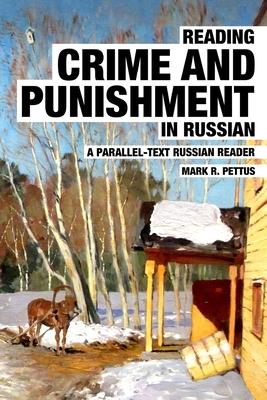Dostoevsky's Crime and Punishment is one of the most gripping novels in the Russian canon. Often described as a murder mystery in search of a motive, it follows a former student in St. Petersburg, Rodion Raskolnikov, as he commits a grisly murder - a murder he justifies by both a peculiar sort of "arithmetic" and by a theory about the right of "extraordinary" people to wade through blood on their path to power. Yet his crime itself suggests that he is far from extraordinary - at least, not in the sense he had hoped. As he seeks out the real motivation behind his crime, he is confronted with life's deepest questions: what it means to have a self that one cannot be rid of, and to have an existence one did not ask for and cannot rationally understand. Is life an unfathomable gift, to be affirmed in defiance of any objective measure? Or is it an empty, meaningless joke? And, perhaps most importantly: when life seems over, can we dare to believe that a new life is possible? While locked in psychological warfare with the lead investigator, Porfiry Petrovich, and tempted by the depraved Svidrigailov to embrace his darkest inclinations, Raskolnikov must choose whether to end his life, or to confess, and try to begin again. Along the way, he strikes up an unlikely acquaintance with Sonya, a prostitute, who reveals a kind of existence previously unknown to him. This volume contains a condensed but otherwise unedited and unsimplified version of the novel that follows the novel's main plotline - from the opening lines to the epilogue - allowing students of Russian to delve into Dostoevsky's text in considerable depth. Facing the original Russian text is a new English translation, made specifically for this purpose. Also included are original photographs of many of the locations in the novel, allowing you to follow Raskolnikov's footsteps through St. Petersburg. Designed to help students of Russian begin to enjoy real Russian literature in the original without constantly reaching for a dictionary, this parallel-text edition features detailed Russian vocabulary notes, including all the important forms you need (especially aspectual pairs and conjugation types for all verbs); the text and notes are also marked for stress. The book also features comprehensive grammar tables for reference, with everything from conjugation patterns, to case endings, to verbs of motion and participles.About the Author... Mark Pettus holds a PhD in Slavic Languages and Literatures from Princeton University. Altogether, he's spent around six years living, studying, and working in Russia. Today he is a lecturer in Slavic Languages and Literatures at Princeton. Mark is the author of the Russian Through Propaganda textbook series (Books 1 and 2), and its continuation, Russian Through Poems and Paintings (Books 3 and 4). He is now working on additional books for students of Russian, including the Reading Russian series of which the present volume is a part. Check out www.russianthroughpropaganda.com for a variety of resources for students of Russian language, literature, and culture.

Dostoevsky's Crime and Punishment is one of the most gripping novels in the Russian canon. Often described as a murder mystery in search of a motive, it follows a former student in St. Petersburg, Rodion Raskolnikov, as he commits a grisly murder - a murder he justifies by both a peculiar sort of "arithmetic" and by a theory about the right of "extraordinary" people to wade through blood on their path to power. Yet his crime itself suggests that he is far from extraordinary - at least, not in the sense he had hoped. As he seeks out the real motivation behind his crime, he is confronted with life's deepest questions: what it means to have a self that one cannot be rid of, and to have an existence one did not ask for and cannot rationally understand. Is life an unfathomable gift, to be affirmed in defiance of any objective measure? Or is it an empty, meaningless joke? And, perhaps most importantly: when life seems over, can we dare to believe that a new life is possible? While locked in psychological warfare with the lead investigator, Porfiry Petrovich, and tempted by the depraved Svidrigailov to embrace his darkest inclinations, Raskolnikov must choose whether to end his life, or to confess, and try to begin again. Along the way, he strikes up an unlikely acquaintance with Sonya, a prostitute, who reveals a kind of existence previously unknown to him. This volume contains a condensed but otherwise unedited and unsimplified version of the novel that follows the novel's main plotline - from the opening lines to the epilogue - allowing students of Russian to delve into Dostoevsky's text in considerable depth. Facing the original Russian text is a new English translation, made specifically for this purpose. Also included are original photographs of many of the locations in the novel, allowing you to follow Raskolnikov's footsteps through St. Petersburg. Designed to help students of Russian begin to enjoy real Russian literature in the original without constantly reaching for a dictionary, this parallel-text edition features detailed Russian vocabulary notes, including all the important forms you need (especially aspectual pairs and conjugation types for all verbs); the text and notes are also marked for stress. The book also features comprehensive grammar tables for reference, with everything from conjugation patterns, to case endings, to verbs of motion and participles.About the Author... Mark Pettus holds a PhD in Slavic Languages and Literatures from Princeton University. Altogether, he's spent around six years living, studying, and working in Russia. Today he is a lecturer in Slavic Languages and Literatures at Princeton. Mark is the author of the Russian Through Propaganda textbook series (Books 1 and 2), and its continuation, Russian Through Poems and Paintings (Books 3 and 4). He is now working on additional books for students of Russian, including the Reading Russian series of which the present volume is a part. Check out www.russianthroughpropaganda.com for a variety of resources for students of Russian language, literature, and culture.